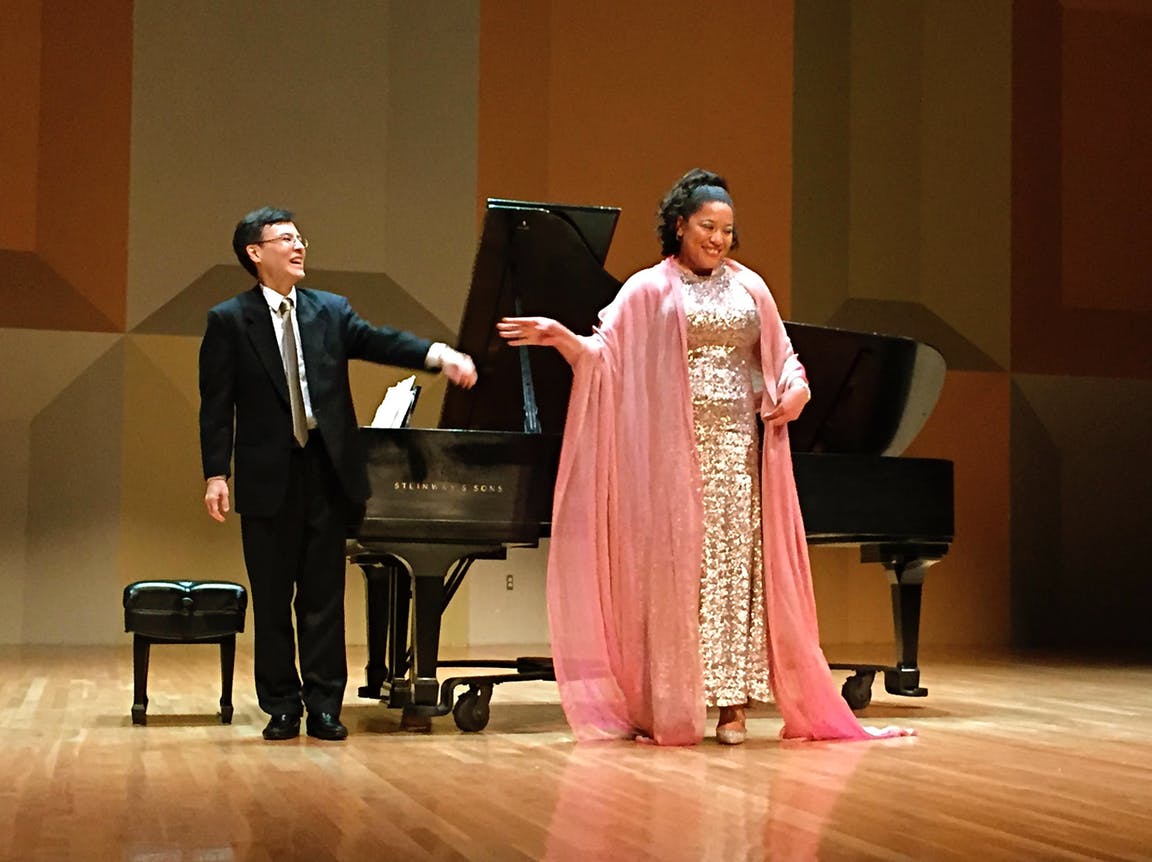
Rising opera star Michelle Bradley makes Miami debut

The work of a music critic demands, among other things, good judgment, responsibility, concentration, balance, distance, being true to oneself and, above all, honesty. It is quite a job, providing excitement, joy, boredom, displeasure, too many frustrations and some rewards. Pleasant surprises occur–often when you least expect them. And once the initial dazzle of a strong performance has passed, the critic must come down to earth, examine, remember and attempt to be temperate. In the case of Michelle Bradley, doing so is difficult.
The realization that Bradley’s talent and performance are “just too good” hits you mid-recital. You feel torn between continuing to revel in the experience and running to call everyone you know to urge them to come catch the ending. Your only accomplices are the few people also in attendance (in this case, too few–a serious symptom of the apathy afflicting our local audiences). We must remember that too often it’s not necessary to travel to enjoy great performances; the miracle could be just around the corner.
Bradley, who recently turned 34, boasts a formidable voice and majestic bearing. The music teacher and member of the Houston Grand Opera chorus was discovered through the Metropolitan Opera’s Lindemann Young Artist Development Program. In her second year of training, the Kentucky native impressed mezzo-soprano Marilyn Horne and the opera’s former music director, James Levine, who took her under their wings. Following a season of performances with the Met’s Summer Recital Series, with lucrative national and international offers on the table, Bradley made her Miami debut on Saturday, Nov. 5, thanks to the infallible discernment of pianist and voice coach Ken Noda, who year after year brings emerging Met talent to the Friends of Chamber Music season. This year, results exceeded expectations. Bravo!
Accompanied by Noda, the soprano dazzled in an extremely difficult and eclectic program that showcased her exceptional voice. Opulent in the middle ranges, suggestive of an incipient mezzo in the low notes, and surprisingly adroit in the high ones, Bradley displayed superlative authority and nobility as she opened the program with “Porgi Amor.” The difficult, tricky aria, a sample of Wolfgang Mozart’s mischievous talent, calls for perfect legato delivery. It was followed by a simply masterful rendition of Richard Strauss’s “Four Last Songs”–a performance even more astounding when you learn it was her first public performance of the song cycle. The peaks and valleys of Strauss’s glorious autumnal hymn provided an ideal framework for her instrument. The French tradition shone in Gabriel Fauré’s “Notre Amour,” Francis Poulenc’s “Les Chemins de l’Amour” and a version of Marc-Antoine Charpentier’s “Depuis le Jour” that tested Bradley’s pianissimos and ability to hold a note. She delivered a similary successful “D’Amor Sull’Ali Rosee,” the fearsome Giuseppe Verdi aria that lays bare all of a voice’s defects and requires a complex battery of resources to get through. Bradley passed the test with flying colors, as she did that posed by the Bolero from “Les Vêpres Siciliennes.” “Doretta’s Dream” from “La Rondine” confirmed the soprano’s broad stylistic range even before she closed with two moving spirituals: “This Little Light of Mine,” sung a capella, and “He’s Got the Whole World in His Hands,” which earned a well-deserved ovation.
Soprano Victoria de los Ángeles would accompany herself on her guitar during encores, and Bradley followed this example, sitting at the piano and delighting the audience with “Trust,” a beautiful song she composed herself, as well as the most electrifying a capella rendition of “America the Beautiful” you can imagine.
Those of us in attendance were in the presence of an atypical singer who reminds us of many but does not resemble any–a genuine rara avis capable of inspiring and thrilling with her magnificent voice and charming presence. It was a recital that drove home the essential purpose of attending a musical event: to leave comforted and a better, more fully human person. Though time will have the final say, for Bradley the future looks bright. For now, an artist of her caliber is proof that still, to paraphrase Jorge Luis Borges, in the cracks, hope lurks.
Sebastian Spreng is a freelance music critic and arts writer. Email him at [email protected] and follow him on Twitter @sebastianspreng.
Recent Content
-
Artsarticle ·
-
Artsarticle ·
-
Artsarticle ·
